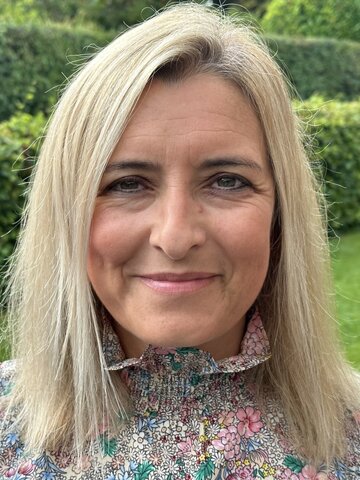“Safeguarding is everybody’s responsibility”
We are committed to safeguarding and promoting the welfare of children. As such we expect all Egerton staff, volunteers and visitors to share this common commitment.
Safeguarding Team

Caroline Lowe
Designated Safeguarding Lead & Headteacher

Monika Sedgwick
Deputy Designated Safeguarding Lead & Deputy Headteacher

Leanne Renton
Deputy Designated Safeguarding Lead & Early Years Lead
Children have a right to be cared for and protected, protecting them is everyone’s responsibility. Here at Egerton Primary School we have a duty of care to ensure that all users of the school are kept safe from harm. We are committed to provide a secure and supportive environment in which children can develop and grow into mature and responsible people. Safeguarding children is an essential part of our holistic approach to ensure that children are protected from abuse and neglect and that every child reaches their full potential.
Safeguarding Policy
The school’s staff, volunteers and service providers have a duty to safeguard and promote the welfare of children as a shared responsibility with parents and other carers. To support this statement, the school may signpost to services that are specialised to promote opportunity, prevent problems, act early and act effectively if and when concerns arise. Therefore, whilst we do not want to worry you, we will report to Children’s Social Care if we have any reason to believe that a child may be at risk of suffering abuse or neglect.
Parents/carers are normally our first point of contact, and if a suspicion of abuse is recorded, parents/carers will be informed, unless where doing so would put a child at risk; we will support parents/carers and ensure we work in collaboration with them to protect children. Working with parents/carers to prevent abuse is our primary aim and only when that has failed or in emergency situations will a referral be made to social care. When a referral is made to social care parents will be notified beforehand, except when guidance from social care or the police does not allow this.
We cannot safeguard children alone. All children’s services agencies work in partnership with each other. There are duties and rules about information sharing but if staff, parents or carers have any concerns about a child, other parent, provider, agency or any person, they have a responsibility to report those concerns and we must record and act on them We have an ‘Egerton Primary School safeguarding /child protection policy’ - see above document - which is underpinned by Cheshire Safeguarding Children Board Procedures and the document “Working Together to Safeguard Children” and Safer Recruitment guidance. The policy applies to all children and young people regardless of gender, ethnicity, disability, sexuality or religion. It is a requirement that all users are informed of these policies and practice guidance and what they should do if they have concerns.
Y6 Health and Safety Team
Our Year 6 Health and Safety Team meets regularly with Mrs Lowe to talk about all things safeguarding, and health and safety issues in the school, how to make things better and how to keep everyone safe. This term we have reviewed our Child Friendly Safeguarding Policy as well as our Child on Child policy too.
Please click on the links above
What you can do - Concerns and Contact
Parents and carers play a role in safeguarding children in their community. If you have any concerns, no matter how small, you should report them to someone who you trust will listen. The school is required to have a designated safeguarding lead (DSL) for this purpose. Parents and children should speak to the DSL if they have any concerns about a child or staff member. (Mrs Lowe DSL and Mrs Sedgwick and Miss Renton Deputy DSL's).
If you think a child or young person may be in immediate danger, call 999. Otherwise contact Cheshire East Consultation Service: 0300 123 5012 (option 3).
Designated Safeguarding Lead: Caroline Lowe
Deputy Designated Safeguarding Lead: Monika Sedgwick & Leanne Renton
Chair of Governors & Safeguarding Lead: Neil McKinlay
Mental Health Lead: Stephanie Taylor Wattam
Local Contacts
- Cheshire East Consultation Service (CHECS): 0300 123 5012
- Emergency Duty Team: 0300 123 5022
- Local Authority Designated Officer (LADO): 01270 685904 / 01606 288931
- Prevent referrals: Prevent/Channel Referral Process (stopadultabuse.org.uk)
- Police: 999 (Emergency) / 101 (Non-emergency)
- Mental Health Helpline: 0300 303 3972
- Adult Safeguarding: 0300 123 5010
For out of hours support call: 0300 123 5022
Operation Encompass - Police
Our school is part of a project, which is run between Cheshire East schools and Cheshire Police. The project called Operation Encompass, has been designed to provide early reporting of any domestic violence incidents that occur outside school, which might have an impact on a child in school. This is done through a phone call to school following an incident. The project ensures that at least one member of the school staff, known as the Key Adult, is trained to liaise with the police and to use the information that has been shared, in confidence. In this way, we aim to support each child who has been involved in, or witnessed, a domestic abuse incident. If we receive an Encompass call we will make sure that a person the child trusts is available to support. Most of the time this support is silent; keeping a careful eye on him or her and make sure the child has a calm school day.
All schools have a duty to share any information with other organisations if they feel a child is at risk of being hurt. The key adult may contact other organisations. This is described in our child protection policy. Parents can come and talk to our key adult. The key adult can point you towards other people that can help. Our aim is to support children and their families. Our key adult includes Mrs Lowe (Headteacher), Mrs Sedgwick (Deputy Headteacher) and Mrs Broadbent (Designated Safeguarding Lead/Inclusion Lead).
Operation A & E - Self-Harming
Where a child under the age of 16 attends Accident & Emergency or is admitted onto a hospital ward following a self-harm incident, the hospital will communicate this, at the earliest opportunity, to the Safeguarding Lead in school.
Online safety is an integral part of children’s education in today’s digital world and is embedded in their learning at school. We also want to help our parents and children improve their own understanding of e-safety issues so they can learn to use the internet and all digital media in a safe and secure way.
At Home
As a parent, you'll know how important the internet is to children - they use it to learn, play, socialise and express themselves. It's a highly creative place of amazing opportunities. But the technology children use every day can seem a bit daunting and you might worry about the risks your child can face online - such as bullying, contact from strangers or the possibility of them seeing illegal or inappropriate content.
You can download a simple checklist below that may help you start to protect your children online and decrease the risks they face. Or you can engage with your children regarding their use of the internet while at home. Here are some conversation starter ideas from www.childnet.com
- Ask your children to tell you about the sites they like to visit and what they enjoy doing online.
- Ask them about how they stay safe online. What tips do they have for you, and where did they learn them? What is OK and not OK to share?
- Ask them if they know where to go for help, where to find the safety advice, privacy settings and how to report or block on the services they use.
- Encourage them to help. Perhaps they can show you how to do something better online or they might have a friend who would benefit from their help and support.
- Think about how you use the internet as a family. What could you do to get more out of the internet together and further enjoy your lives online
At School
As part of your child’s curriculum and the development of computer skills, we provide access to the internet only in teacher supervised lessons. We strongly believe that the use of the web and email is hugely worthwhile and an essential tool for children as they grow up in the modern world. But because there are always concerns about children having access to undesirable materials, we have taken positive steps to deal with this risk in school. Our school internet access provider operates a filtering and monitoring system that restricts access to inappropriate materials.
At the start of the school year and then throughout the year, each class discusses how we can all stay safe online and the dangers we may face on the internet.
Cyber-bullying
Cyber bullying is any form of bullying which takes place online or through smartphones and tablets. Social networking sites, messaging apps, gaming sites and chat rooms such as Facebook, XBox Live, Instagram, YouTube, Snapchat and other chat rooms can be great fun and a positive experience but they can be used as platforms to upset and bully individuals.
Tips and advice
- If you post abuse about anyone else online or if you send threats, you can be traced by the police without any difficulty. Every time you visit a website or make a posting, your internet service provider, Sky, BT or Virgin, has an electronic note of your activity. Even if you create an anonymous email address like Gmail, Hotmail or Yahoo, you can still be traced.
- Keep safe by using unusual passwords. Use a combination of letters, lowercase, uppercase, symbols and numbers. Don't use any part of your name or email address and don't use your birth date either because that's easy for people who know you to guess. Don't let anyone see you signing in and if they do, change the password as soon as you can.
- If you are using a public computer such as one in a library, computer shop, or even a shared family computer, be sure to sign out of any web service you are using before leaving the computer so that you can protect your privacy.
- Being bullied online can affect someone enormously. Being bullied can impact on a person’s self-esteem, confidence and social skills. Try to consider the impact your words may have and think twice before posting.
-
Think twice before you post anything online because once it’s out there you can’t take it back.
-
Social Media
The more you know about the kind of social networking sites your children belong to and what information they like to share, the more likely you’ll be able to keep them safe:
- The age limit to join most social networking sites is 13
- The most popular social networks include Facebook, Instagram, YouTube, Twitter, TikTok and Snapchat; sites aimed at younger children, like Club Penguin and Moshi Monsters, also have a social networking element
- Many sites include an instant message function that allows private conversations between site members
- You can create ‘privacy settings’ on most social networking sites, so only close friends can search for your children, tag them in a photograph or share what they post
- Most social networking sites have an app, which means your children will have access to the social network from their (or your) smartphone or tablet
- Facebook, for example, has a setting that allows your children to approve or dismiss tags that people add to their posts
- Information shared between friends can be easily copied and may spread widely
- It isn’t easy to take back information once it’s online, and it can be impossible to recover after someone has shared it
- Not everyone your child meets online will be who they say they are
- Chat rooms and forums are one of the places that online groomers visit to connect with children; they can also be places where people use a lot of sexual language and engage in online flirting
-
Other Useful Links:
- Know It All Free e-safety resources for teachers and parents
- Think U Know Guide to internet safety and safe surfing for young people.
- CEOP News and Articles about e-safety
- Internet Safety for Kids | O2
Online Safety User Guides
Private Fostering
Private fostering is where a parent arranges for a child aged under 16 (or 18 where the child has disabilities) to be cared for by someone other than a close relative for 28 days or more. If you aren't a close relative of a child you are looking after for 28 days or more, you must let Cheshire East Social Services know by calling 0300 123 5012. If school becomes aware of a Private Fostering arrangement, it is our duty also to inform Cheshire East.
For further information please click the link below to go to Cheshire East's website:
Healthy Relationships for Teens & Young People
Act on It | For a Safe Relationship
Domestic Abuse
Please visit the websites below if you are concerned about your own safety or that of others, or need support:
MyCWA (Cheshire Without Abuse)
Cheshire East Council | Domestic Abuse - Getting Help
Mental Health Support & Crisis Support
Support with Infant Crying
After Separation or Divorce